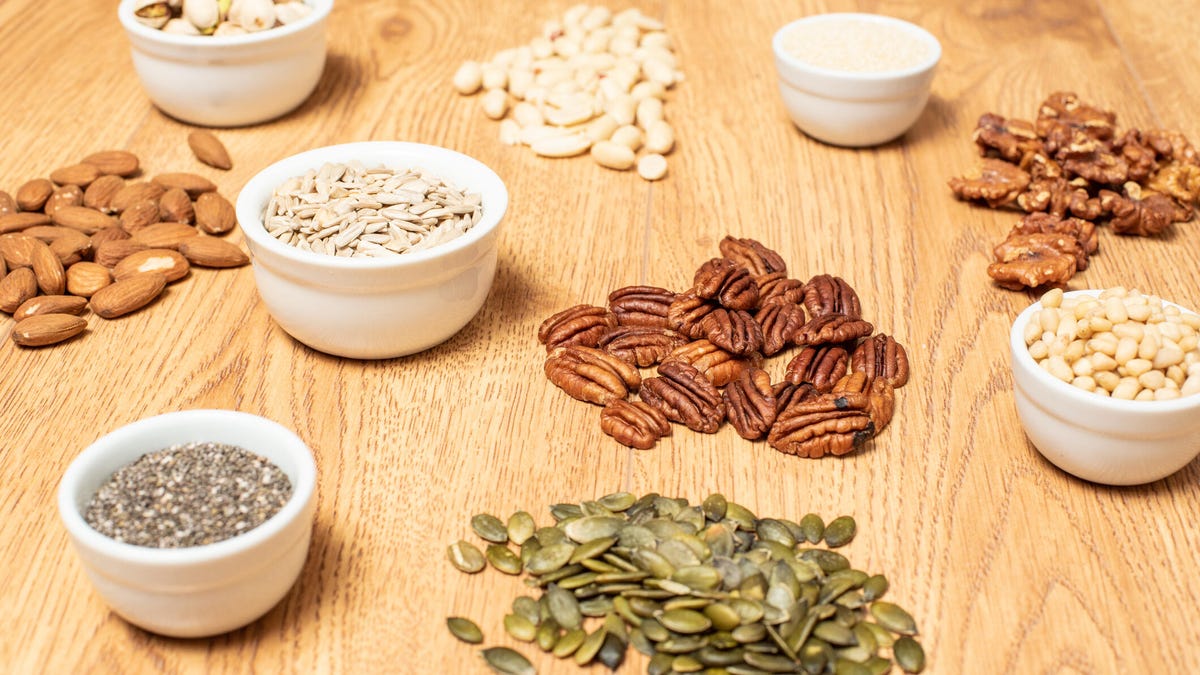:max_bytes(150000):strip_icc()/WHTYBW-You-Eat-Brazil-Nuts-0275d4bab54745e398e4ff17825383c3.jpg)
Nuts are renowned for being a great healthy snack option, as they contain fiber, healthy fat and protein all in one convenient and portable package. Brazil nuts—one of the healthiest nuts to snack on—are a less common addition to a kitchen pantry. But this mineral-rich food has been trending on TikTok for a reason. We’ll explore Brazil nuts’ nutrition facts, health benefits, precautions, how to enjoy them and more in this deep dive.
Health Benefits of Brazil Nuts
There are a host of benefits of consuming Brazil nuts that range from your gut to your brain. Here we’ve rounded up the top ones to help explain why this nut deserves a spot in your eating pattern.
They’re High in Selenium
Just one Brazil nut offers 175% of recommended daily selenium intake. According to Amy Gorin, M.S., RDN, owner of Plant Based with Amy, this lesser-heralded nutrient deserves a little attention. She says, “Selenium is an essential nutrient and it plays an important role in the human body for reproduction, DNA synthesis and more. Selenium is also important for the thyroid function—and has antioxidant benefits that help prevent tissue and DNA damage.”
That said, since they’re such a potent source, it’s best to limit your intake to at most three Brazil nuts per day to avoid overconsuming selenium.
They’re Packed with Antioxidants
Brazil nuts also contain vitamin E, a nutrient that has antioxidant powers. It helps protect our body cells from free radical damage and supports healthy vision, heart health, skin health and more. And since vitamin E is a fat-soluble vitamin, the healthy fats that nuts contain help it to be absorbed more effectively in the body.
Brazil nuts are also rich in an antioxidant called ellagic acid, which has been linked to keeping brain cells healthier and lowering the risk of neurodegenerative disorders like Alzheimer’s disease. Try adding them alongside other antioxidant-rich foods, like chocolate, berries and spices, for even more health benefits.
They Support Your Immune System
Brazil nuts are a good source of zinc. Zinc is a mineral that is crucial for helping your immune system function at its best, and research suggests that it helps alert neutrophils and natural killer cells—our bodies’ first lines of defense—to diseases. Zinc also helps keep inflammation at bay, along with supporting wound healing. Mix in other foods that contain zinc, like seafood, yogurt and legumes, for even more immune support and for best results.
They’re Rich in Healthy Fats
We know that cutting out all dietary fat isn’t healthy or sustainable, and our bodies need fat in our diets to thrive. Brazil nuts are a great source of healthy fats, with more than a third of their fat content coming from polyunsaturated fatty acids. This type of fat helps support your heart health by lowering LDL cholesterol levels (often called “bad” cholesterol) and decreasing the risk of heart disease and stroke.
Brazil Nut Nutrition
The nutrition information for one Brazil nut is:
- Calories: 33
- Carbohydrates: 1g
- Dietary fiber: 0g
- Total sugar: 0g
- Added sugar: 0g
- Protein: 1g
- Total fat: 3g
- Saturated fat: 1g
- Cholesterol: 0mg
- Sodium: 0mg
- Magnesium: 19mg (6% Daily Value)
- Potassium: 33mg (1% DV)
- Selenium: 96mcg (175% DV)
- Vitamin E: 0.3 mg (2% DV)
Potential Risks
The main potential risk of regularly eating Brazil nuts is overconsuming selenium. Known as selenosis, selenium toxicity is a rare but possible condition from consuming too much of the mineral. Side effects can include brittle nails and hair, skin rash, nausea, diarrhea, fatigue and, in severe cases, breathing problems and kidney failure. The tolerable upper limit that is considered safe for selenium is 400 micrograms, which is approximately three Brazil nuts. It’s best to limit your intake to at most three Brazil nuts per day to avoid any negative symptoms. And if you’re experiencing any side effects from consuming Brazil nuts, talk to your health care team.
Finally, as with many other nuts, people may be allergic to Brazil nuts. They are considered a tree nut, so anyone with sensitivity to that category of nut should proceed with caution. Being allergic to one tree nut does not guarantee an allergy to other tree nuts, but it’s important to talk to your health care team to identify if it’s safe for you.
Tips for Consuming Brazil Nuts
Now that we know the slew of health benefits of Brazil nuts, here are some easy ways to incorporate them into your diet. The easiest way to enjoy Brazil nuts (remember, at most three per day) is simply by snacking on them. Since they are shelf-stable, they’re a great option to grab and go.
Beyond eating them on their own, you can chop up Brazil nuts to add to energy balls, homemade granola bars, smoothie bowls, trail mix and more. Just be mindful of how many Brazil nuts you’ll be consuming per serving.
The Bottom Line
While Brazil nuts can be a healthy addition to your diet, its important to consume them in moderation (up to three Brazil nuts per day) to avoid potential selenium toxicity. But if enjoyed safely they can lead to numerous health benefits for your immune system, brain, heart and more. Add them to your eating pattern for a crunchy bite that adds a punch of nutrition and antioxidants.
Frequently Asked Questions
-
How many Brazil nuts should you eat a day?A safe serving size is one to three nuts per day, depending on the size, to avoid overconsuming selenium. Selenium toxicity can lead to negative health effects, so be mindful of consuming Brazil nuts, since they are high in this mineral.
-
Is it OK to eat Brazil nuts every day?They can be eaten daily, as long as the portion size is controlled. It is considered safe to eat up to three per day, but you can enjoy them once every few days instead if you’re worried about it.
-
Which is the healthiest nut?Nuts all have their own benefits and can be very nutrient-dense parts of a healthy diet. There’s no such thing as the ultimate healthiest nut, because it depends on your goals, health status and preferences.
-
Do Brazil nuts help you sleep better?Since Brazil nuts are high in magnesium, which is linked to melatonin regulation, they may help promote better sleep. Selenium plays a role, too. People suffering from insomnia may be deficient in this trace mineral, and Brazil nuts are one of the best food sources of selenium available (just be mindful to avoid overconsumption).
link



:max_bytes(150000):strip_icc()/Best-Condiments-for-Better-Blood-Sugar-According-to-Dietitians-aa44e694e2324a269ad75f1518d40d2f.jpg)

